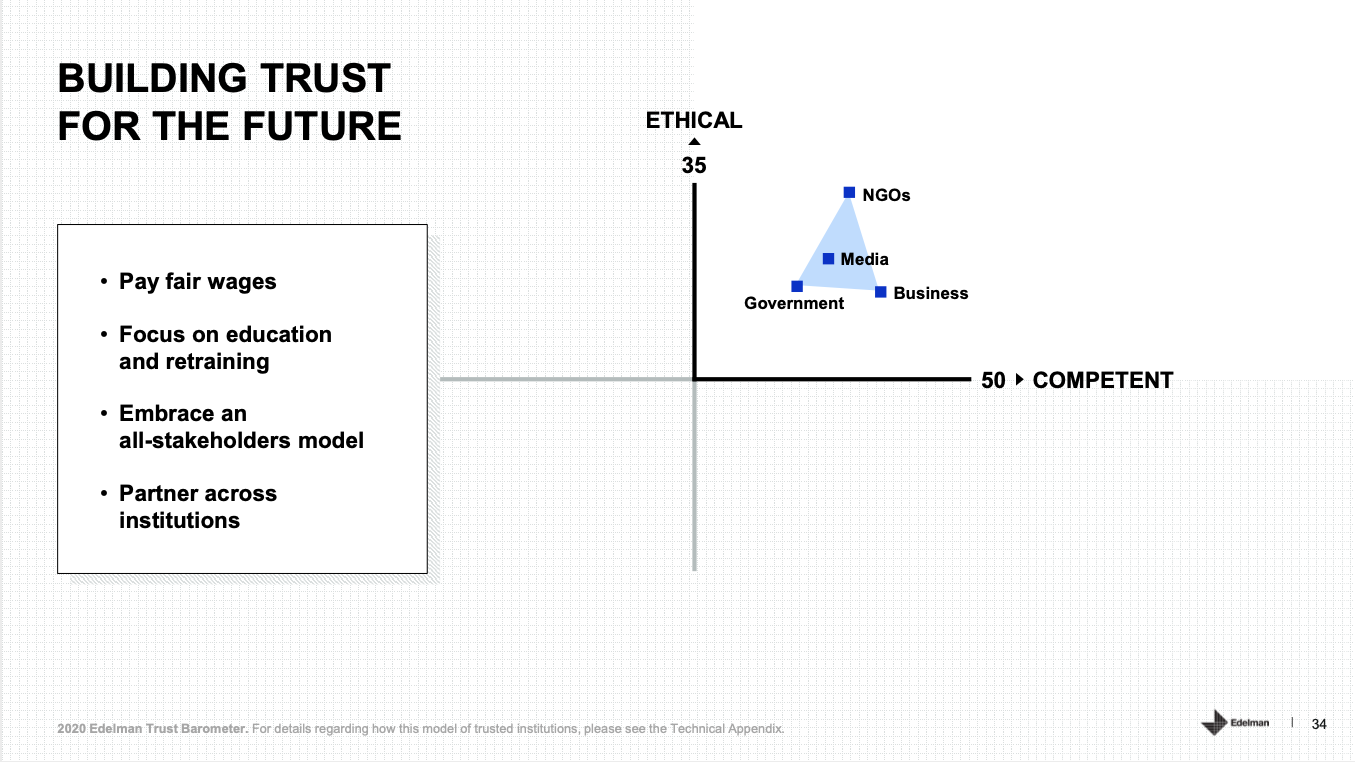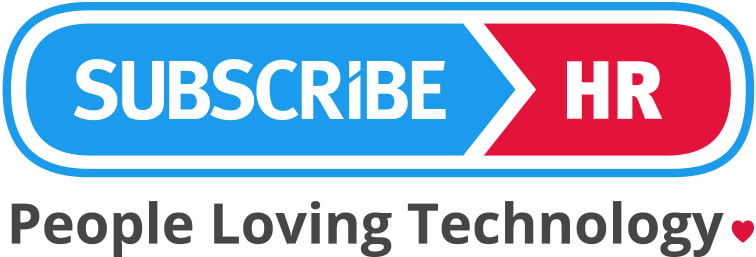Edelman has been publishing their annual Trust Barometer Report for 20 years now, and the 2020 report illustrates what you might call an 'epic fail' in trust across the board. No institutions are seen as being both competent AND ethical. Only business is seen as being competent and only NGOs are seen as ethical. Add to that the fact that 56% percent of respondents believe that capitalism as it currently operates today is doing more harm than good and you can see that there is both a significant need for change as well as a tremendous opportunity for transformation. It shouldn't surprise anyone to hear that trust and transparency are more critical to success than ever, especially given current circumstances. So let's take a look at the highlights from the 2020 Trust Barometer Report and how they matter to you.
Why Trust Matters More Than Ever
In 2020, trust is built on both competence AND ethics. However, the prevailing sentiment amongst the Trust Barometer Report respondents is that trust and competence do not align in any institutional group. As mentioned in the introduction, only business is seen as being competent and only NGOs are seen as ethical. That means trust in the competence and ethics of government in particular has gone backwards, especially in Australia. Given the sports rorts affair (amongst other unethical shenanigans at the state and federal levels), this is hardly surprising. However, if you're an NGO, NFP or charity you're in a good position right now to leverage your trusted position to be able to do even more good in the world, but there is work to be done to find efficiencies and improve competence.
Can This Paradox Be Reconciled?
Edelman's 2020 barometer reveals that despite a strong global economy and near full employment at the end of 2019, none of the four societal institutions that the study measures; government, business, NGOs and media, are trusted. The cause of this paradox can be found in people’s fears about the future and their role in it, which offer a serious wake-up call for our institutions to embrace a new way of effectively building trust: balancing competence with ethical behaviour. Given the current global pandemic, trust is being tested in extremis and the next 12 to 18 months will provide some very interesting results on the trust continuum.

2020 Report Highlights
Against the backdrop of growing cynicism around capitalism and the fairness of our current economic systems are deep-seated fears about the future. Such fears will only be amplified by the fallout from the current global pandemic. Edelman's report indicates that 83 percent of employees said they feared losing their job, attributing it to the gig economy, a looming recession, a lack of skills, cheaper foreign competitors, immigrants who will work for less, automation, jobs being moved to other countries. All of that is before the global issue we're now experiencing that came completely out of left field.
The rest of the headlines from the 2020 report are as follows:
-
56% of respondents believe capitalism as it exists today is doing more harm than good.
-
83% of people worry about losing their job to one of the causes mentioned above.
-
61% believe the pace of change in technology is too fast.
-
66% worry technology will make it impossible to know if what people are seeing or hearing is real.
-
61% believe government does not understand emerging technologies enough to regulate them effectively.
-
57% believe the media they use are contaminated with untrustworthy information.
-
76% worry about false information or fake news being used as a weapon.
-
66% do not have the confidence that current leaders will be able to successfully address the challenges faced by their country of residence.
-
87% believe stakeholders not shareholders are most important to long-term company success.
-
73% believe a company can take actions that both increase profits and improve conditions in communities where it operates.
-
92% believe it is important for CEOs to speak out on important issues (like climate change, automation, ethical use of tech).
-
73% expect business has an (and to use their) opportunity to shape the future of society.
-
73% of employees expect to be included in planning.
What Really Matters in Building Trust
According to Edelman's research, trust is undeniably linked to doing what is right. After tracking 40 global companies over the past year through their Trust Management framework, they've discovered that ethical drivers such as integrity, dependability and purpose contribute to 76 percent of the trust capital of business, while competence accounts for only 24 percent.
At the heart of the Trust Management framework is the Edelman Net Trust Score (ENTS), a simple, audience-agnostic metric that assesses the trust capital of an organisation. Trust capital is an organisation’s most precious asset, one that, has a very strong influence on overall performance. That means that members of the C-suite who wish to protect and promote their organisation’s interests and harness the power of trust for their business should consider 'ENTS' a critical KPI.
To diagnose trust, Edelman partnered with world-renowned academics and business leaders to unearth four key dimensions that drive corporate trust:
-
Ability: Is the company competent?
-
Integrity: Is the company honest?
-
Dependability: Does the company keep its promises?
-
Purpose: Does the company have a positive impact on society?
The Rise in Belief Driven Buying
Businesses who believe their social license to operate will continue despite being bad corporate citizens should very seriously consider not just their values and purpose but also their operations. There is a massive shift underway in the purchase intent and choices consumers make. Take a look at the feedback Edelman asks respondents about as part of the annual survey:
-
Even if a company makes the product that I like most, I will not buy it if I disagree with the company’s stand on important social issues.
-
I have bought a brand for the first time for the sole reason that I appreciated its position on a controversial societal or political issue.
-
I have stopped buying one brand and started buying another because I liked the politics of one more than the other.
-
I have strong opinions about many societal and political issues. The brands I choose to buy and not buy are one important way I express those opinions.
-
If a brand offers the best price on a product, I will buy it even if I disagree with the company’s stand on controversial social or political issues [reversed scored].
-
I have stopped buying a brand solely because it remained silent on a controversial societal or political issue that I believed it had an obligation to publicly address.
Essentially that means the values of your organisation matter a lot, but what matters even more is that you actually live your values in word AND action right across your organisation. As mentioned earlier, if you're an NGO, NFP or charity you're in a good position right now to leverage your trusted position to be able to do even more good in the world, but there is work to be done on improving efficiencies and competence. That is an easier task than the one facing the rest of the businesses covered by this survey - who face the challenge of restoring trust, which is increasingly hard to gain and eternally easy to lose.
Looking for inspiration to find other ways to support a flexible workforce and deliver efficiencies in times of change? Every year a selection of well-researched people management reports are published by the likes of KPMG, Edelman, PWC, Deloitte (and more). They cover the changing nature of work and the latest HR statistics, metrics and trends. We've curated the most relevant HR statistics, metrics and trends from the reports published during the last 12 months.


